
THE MUSCLE CAR RACING DIORAMA
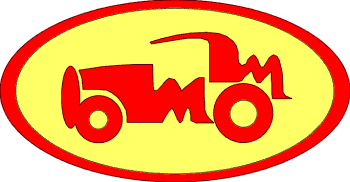 Contest
Winner - Best Model Of the Month , September 2000.
Contest
Winner - Best Model Of the Month , September 2000.
The diorama was made for the on-line contest at http://www.carsmodelcargallery.com ,but the history began long ago when I was building my Corvette Roadster. While surfing, I met the picture below and immediately fell in love with the looks. I had no knowledge of what the Grand Sport was by then. Surfing more, and communicating with fans, I got into more detail and getting to know that Accurate Miniatures had two models of Grand Sport was a joy. What was more joy was that they were both coupes and I had to make some scratchbuilding for modeling this car.

When I read in the contest that the subject of the first quarter's contest was "60's muscle cars" , I said to myself that this was the subject. Then I thought that a diorama in a race would be much more appealing than a single car. I began searching where this car raced and in the end came up with the information (thanks Pete , http://www.corvette-autos.com/grandspr.htm ) that the car I was making had raced only once in March 1966, Sebring and retired in lap 65 due to a crankcase failure. But I also learned that when racing,the hood was different, much like a normal corvette, the headlamps covered, The A-posts being still unequal lengths left+right but a full windshield was installed between them instead of the unequally halfway-cut windshield. The headrest bulge on the boot was missing as well. So the car did not look as sexy to me. So I decided not to be authentic about the race, but rather make a diorama about a practice some time before the race. I love modeling because you learn so small details that so little people in the world know about.
It took enormously
long time to match the
color. I even asked Sunoco their code for blue but no reply came. I got
the answer from Pete again, saying that Roger Penske had
ordered
one of his crew to mix colors to suit Sunoco blue for sponsorship, and
so the paint never had a code number. I downloaded enough Sunoco
emblems
and blue tones from their webpage and I got a sense of their blue. The
next thing was to mix blue paints to reach it and the result came from
an acrylic spray paint of Dupli-color (German paint) which has no codes
but the colored cap as reference. I applied Tamiya's clear blue X-23
over
that paint and got an excellent result.
The second car I chose, communicating with my friend James Bush, to be a 1966 Shelby Mustang GT 350. In my searches, I got the entry list of the 26 March 1966 Sebring 12-h race. There seemed to be 3 Shelby GT350 entries, two did not start, and the only one left being #82 , driver Terry Kohler. ( It retired in lap 71 due to transmission failure).
I got the
Revell-Monogram kit 2482 Shelby
Mustang GT350 Hertz. The Mustang also had to undergo some
scratchbuilding.
The car had to be a GT 350 R (R=racing) which had no bumpers but body
protrutions
instead.
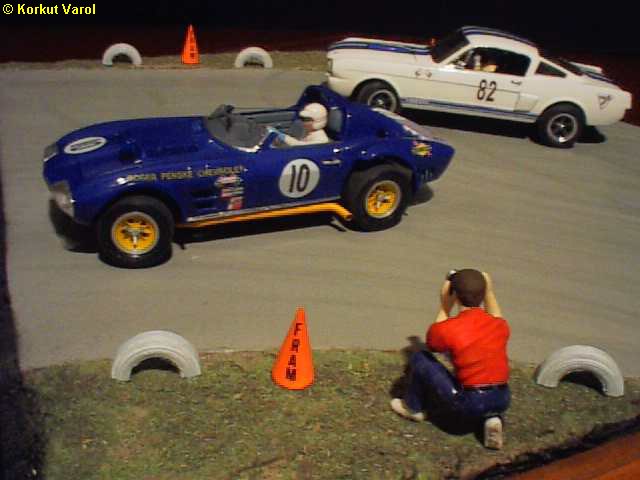
This is a diorama about two muscle cars, a Corvette Grand Sport Roadster and a Shelby Mustang GT350R, in a practice tour at Sebring, some time before the 12-h race on March 26th, 1966. The composition theme is that the two cars are in a curve and about to get out of it. The Corvette is at the inside, has some oversteering which is countersteered by the driver. So it occupies the majority of the curve and the Mustang driver at his back right has gone towards the right edge of the track and trying to steer more into the curve. The mustang has suffered some time ago a slight crash at its right door and is carrying signs of it. Meanwhile, a photographer is shooting, most probably the Corvette's driver at that close distance. (Or else the diorama would have to be twice as big...)
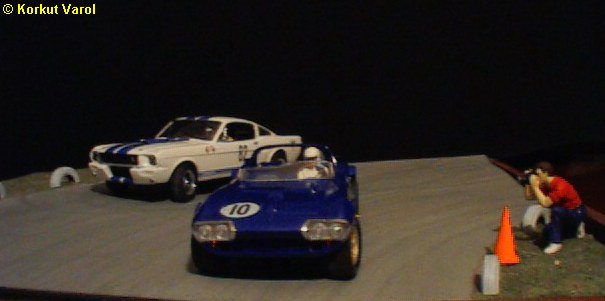
I planned the diorama as the Grand Sport to be in the lead, outgoing a left-bend and having some oversteer which is countersteered by the driver. So, the car has leaned to its right. To give this motion effect, the suspension was altered. The left-hand side suspension elements were stretched whereas the right-hand side ones compressed to give the car a lean of about 3 degrees. The roof and boot were cut to form a roadster version. The same suspension altering was made for the Mustang as well.
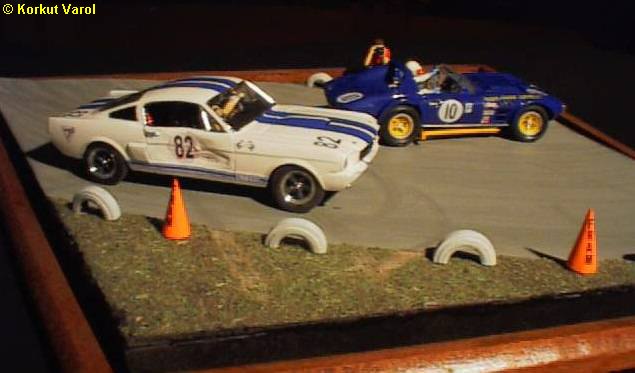
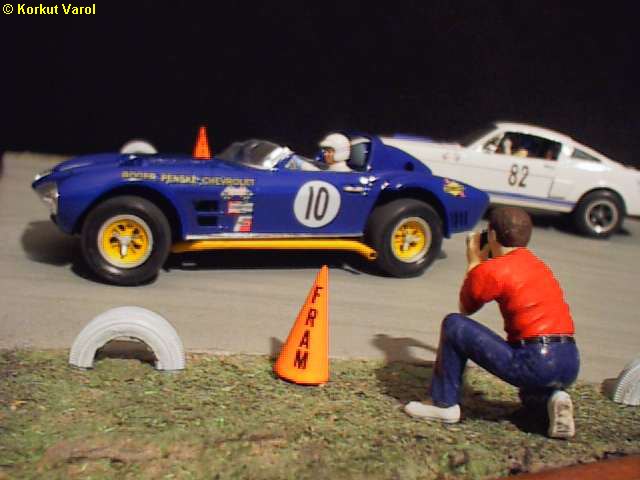
The figures are from Fujimi's driver and mechanics sets. The parts from different figures were combined for the final figures. The camera is scratchbuilt by combining items (a carb, a wheel retainer and a mirror) from my parts box. The headrest bulge of the Corvette is scratchbuilt from balsa, and the top of the boot is from styrene sheet. The decals are computer-generated and copied on decal-paper. The engine is ignition-wired and Bare Metal Foil is applied on the metal parts. The driver wears a scratchbuilt seat-belt with photoetched mating parts from the kit.
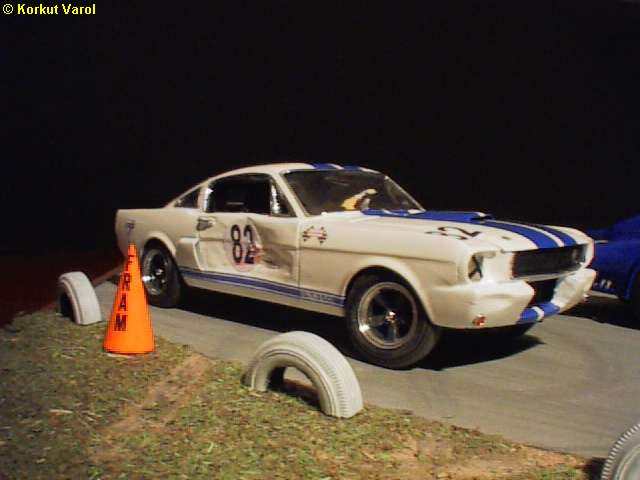
The Mustang has "Torque Thrust" wheels from my parts box. The
main
stripes are painted with masking and the side stripes and other
decals
are computer-generated and printed on decal paper. The engine is
ignition-wired, with the air filter removed and a
scratchbuilt
induction cone put instead. All the window contours, door
handles
and wiper blades are Bare Metal Foil treated. The driver is
secured
to his bucket seat with a scratchbuilt seat-belt.
So now the story
about the constructions:
|
|
|
|
 |
 |
 |